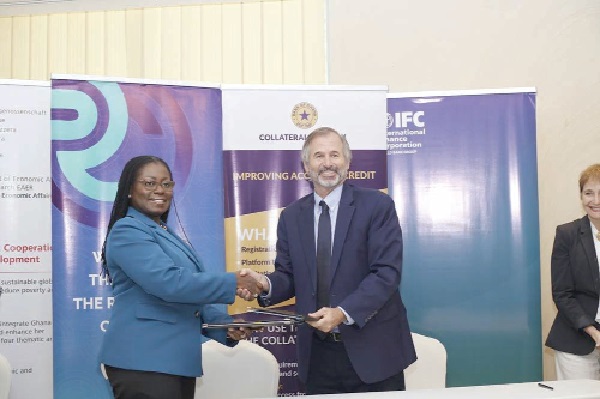
2nd programme to transform Ghana’s credit infrastructure launched
A second phase of the Global Financial Infrastructure Programme (GFIP 2.0) to promote access to finance for smaller enterprises, women-owned businesses and under-served individuals has been launched.
Advertisement
The programme will support Ghana's credit reporting system to broaden its reach and coverage, help strengthen the regulatory framework for movable asset financing, and promote the introduction of innovative lending products to expand business financing options.
In addition, GFIP 2.0 will support the implementation of legislation that defines how to support businesses that are in financial distress and recovery.
It is being implemented by the International Finance Corporation (IFC), in collaboration with the Bank of Ghana (BoG) and the Office of the Registrar of Companies, with support from the Swiss State Secretariat for Economic Affairs (SECO).
MSMEs and the economy
Micro, small and medium enterprises employ approximately 80 per cent of Ghana's workforce and are key to the economy.
However, they struggle to access finance due to a lack of physical immovable property traditionally preferred as collateral by banks, such as real estate or land titles, as well as a lack of formal credit profiles and strict lending requirements imposed by banks.
A strong credit ecosystem is essential to providing businesses with the capital they need to stay afloat, grow and make a positive economic impact.
Efficient credit system
Against this background, the Second Deputy Governor of BoG, Elsie Addo Awadzi, described the development as a game changer, adding that the new entry would provide an efficient credit record system for the financial sector.
She said the regulator had recently granted provisional approval to one credit bureau company to make it potentially three in the country.
“It will enable it to begin some work upon which they get their operations together and based on their final approval to begin full operations. This new entrant comes with a lot more technology and operational capacity to provide more granular services to market players.
“Then we have also increased the capital requirements for these credit bureaus. We are telling them that the market is growing bigger and there was a need for them to strengthen their capacity to be able to meet the growing demand," she said.
Robust credit infrastructure
The IFC Senior Country Manager for Ghana, Liberia, and Sierra Leone, Kyle Kelhofer, said a robust credit infrastructure was essential for a modern, inclusive financial system.
He said it was the foundation upon which financial institutions lent money efficiently, assessed risks, and gave borrowers better loan options.
It is also a key measure of a country's business environment competitiveness.
He said the GFIP 2.0 represented a collaboration between the IFC, the Bank of Ghana (BoG) and the Office of the Registrar of Companies, as well as industry stakeholders to pursue a holistic solution to binding constraints to the deepening of the financial sector in Ghana.
“We are here to build on a vision that sees Ghana's financial system strengthened and access to finance expanded for micro, small, and medium-sized enterprises, women-owned enterprises, and under-served individuals.
“Despite progress, with borrowing rates increasing, the challenge remains that only a small portion of these borrowers are served by formal financial institutions,” he said.
Access to finance
The Head of Cooperation at the Embassy of Switzerland to Ghana, Benin and Togo, Dr Simone Haeberli, said access to finance in Ghana remained a serious challenge for businesses, particularly SMEs that were producing or processing.
The challenge, she said, was due to obstacles ranging from credit information gaps, collateral requirements and weak insolvency procedures.
“Recognising these challenges, we jointly aim to address some of them under this project: enhance the legal frameworks, upgrade credit information systems, facilitate movable asset-based lending, and improve insolvency management, ultimately contributing to greater access to finance, especially for SMEs.
Advertisement
“By partnering the IFC on this programme, Switzerland reaffirms its commitment to advancing financial sector development in Ghana. We count on the authorities' support in addressing the remaining challenges and to contribute to more home-grown economic development,” she said.





